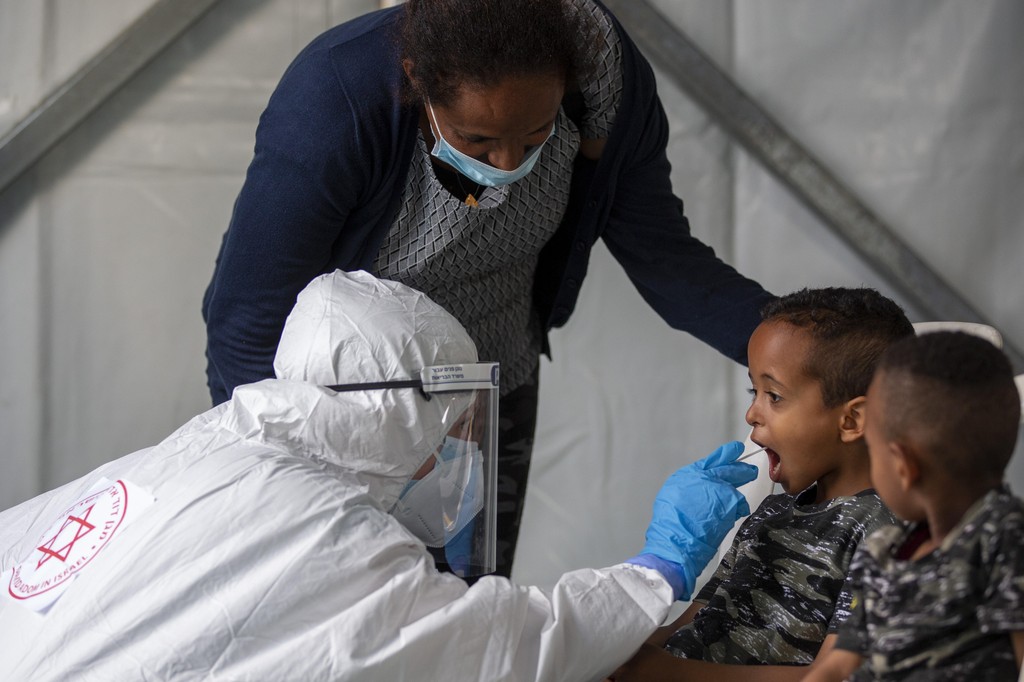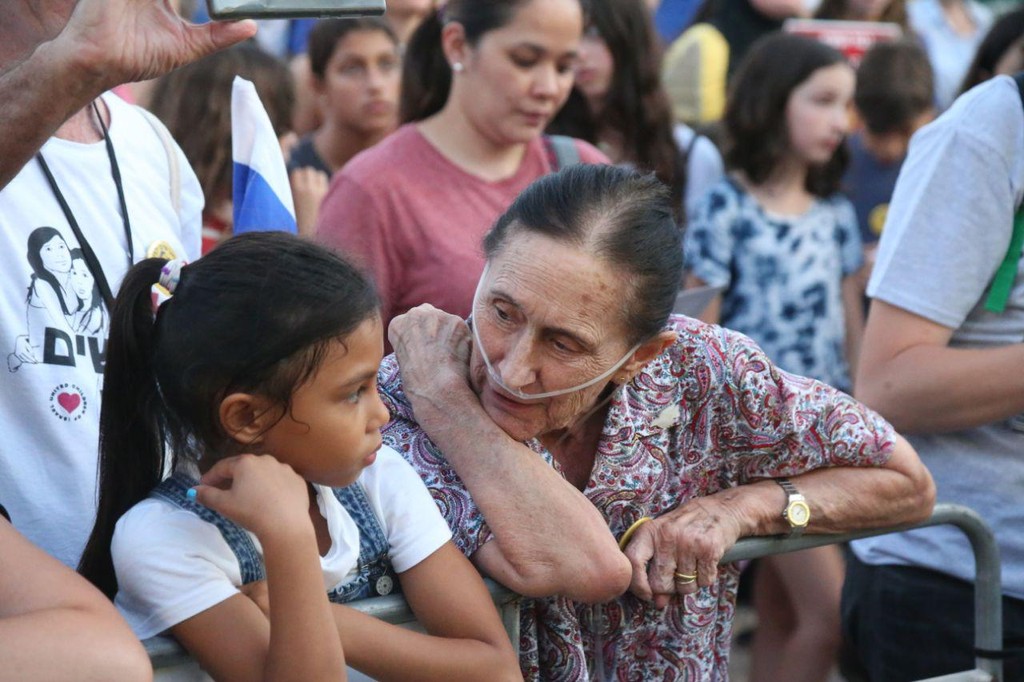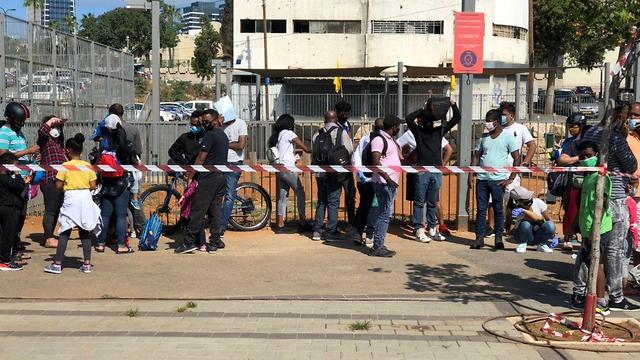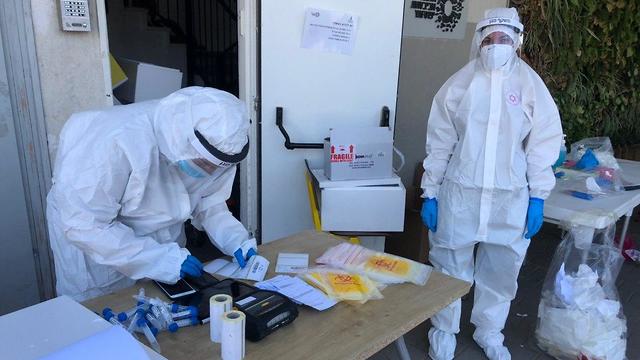From Filipino caregivers and Thai agricultural workers to Palestinians in the construction industry, the coronavirus pandemic has added another layer of uncertainty to migrants in Israel already facing tremendous financial and social hardships, according to civil society organizations.
The Population and Immigration Authority estimates that there are more than 200,000 migrants and asylum-seekers living in the country, including about 101,000 foreigners who entered Israel legally and have work permits.
6 View gallery


A child is tested for coronavirus by a healthcare worker at testing center for migrants in Tel Aviv
(Photo: AP)
Non-residents are exempt from public health services under the National Health Insurance Law of 1995 and instead are eligible for private insurance.
However, even with health coverage, the language barrier is proving an obstacle to navigating the medical system, said Miriam Anati, agricultural coordinator at Kav LaOved – Worker’s Hotline, an Israeli nongovernmental organization focusing on worker rights.
Anati says that there are 22,000 to 23,000 Thai migrants working in Israel’s agricultural sector (officially 24,845 in 2019 according to data from the Population and Immigration Authority) and that nearly all of them can’t understand Hebrew or English.
Therefore, even though they have private insurance, they have no way of accessing health services.
“They can’t set an appointment to go see a doctor or a nurse. Once they go to a doctor or nurse, they can’t explain what it is [that is bothering them]. They can’t understand what the doctor says to them,” Anati says.
“This is an extremely dangerous situation because Thai workers simply have given up on using this health insurance that they have because they don’t know how to handle it. There is no one translating for them.”
Anati acknowledges that there are private agencies set up to assist them in translating but that in practice they are not providing the needed solutions, possibly because they are overwhelmed.
She says that migrant Thai workers often get their information from Kav LaOved’s Facebook page, which is translated into Thai.
Agriculture is considered an essential economic activity so the Thai migrants and Palestinians who work on Israeli farms have been continuing to put food on the tables of Israelis throughout the coronavirus pandemic.
Another problem, according to Anati, is overcrowded conditions in the migrant residential sections of kibbutzim and moshavim that do not allow for social distancing.
“You see many people crowded together in accommodations where they sleep one on top of the other on bunk beds. Very near one to the other,” Anati says.
The Hotline for Refugees and Migrants, a Tel Aviv-based nonprofit which aims to protect the rights of refugees and migrants in Israel, has been working with migrants stuck at detention centers during the coronavirus pandemic.
The majority of the migrants had agreed to return home after overstaying their work or tourist visas but were unable to because flights were canceled to their countries.
“Usually what happens is people get caught. There is this procedure, and a few days maximum after that they get sent home. It’s a very fast procedure in most cases,” says Shira Abbo, spokesperson for The Hotline.
6 View gallery


Israelis stage a 2019 protest for the rights of foreign workers and their children
(Photo: Moti Kimchi)
Abbo says that the migrants held at detention centers were Ukrainian, Russian and Georgian.
She adds: “The pandemic and the fact that there were no flights brought this whole new situation which we never faced before. Migrants were held for months in detention while they really just wanted to go home.”
“The work of the caregiver is always hard and the caregivers in Israel right now are working harder with the coronavirus situation,” says Meytal Russo, caregiver coordinator at Kav LaOved.
According to the 2019 foreign data report from the Population and Immigration Authority, there were at the time 57,111 documented and 12,145 undocumented caregivers in Israel.
Most caregivers are from the Philippines – 20,546 documented and 5,860 undocumented – followed by India and Moldova.
There has been an increased demand for caregivers since the coronavirus outbreak began, according to Kav LaOved, with migrant workers placed with the elderly and in assisted living centers.
“During the first period of the coronavirus, they were not allowed to take any vacation at all. They were staying with their employers full time,” Russo says.
According to Russo, staying inside the homes for long periods without being able to take even a 24-hour break can cause mental stress. The private insurance policies offered to foreign workers exclude mental health services.
Russo says that there are caregivers stuck abroad because the Interior Ministry only allows them to return if the employer pays their expenses and gives them 14 days of quarantine outside of the employer’s home, which can make the situation complex.
There is a need for caregivers to be tested for coronavirus since they work with older people, says Mijal Simonet Corech, spokesperson for Kav LaOved.
However, there are challenges for migrant workers to get tested in Israel.
Foreign workers are not eligible for testing through the country’s health maintenance organizations, so they must rely on other means to get tested for the novel coronavirus such as a designated testing facility for migrants set up in south Tel Aviv by Sourasky Medical Center, the Tel Aviv Municipality and Magen David Adom.
The number of international migrants in the Gulf Cooperation Council countries dwarfs Israel, with 35 million foreign workers in 2019, according to the International Labor Organization.
Foreign nationals make up most of the population in Bahrain, Kuwait, Qatar and the United Arab Emirates. In the UAE, there are an estimated 8.8 million foreigners out of a population of 10 million.
Early in the pandemic, cases spread quickly in crowded housing facilities for migrant workers in special economic zones and industrial cities.
The migrants were brought in to complete big public works projects such as the Expo in Dubai or the 2022 FIFA World Cup in Qatar, said Robert Mogielnicki, resident scholar at the Arab Gulf States Institute in Washington.
“Gulf Arab states moved swiftly to contain the spread of these infections by setting up testing sites within or near these accommodations,” Mogielnicki said.
According to a report from April, the UAE for example had by then already tested more than a million people.
Abdulla Alabsi, chief executive officer of the Labor Market Regulatory Authority for the Kingdom of Bahrain, said that the country had conducted nearly 700,000 coronavirus tests as of mid-June.
In the column penned for the Arab News, he touted the measures taken by the Bahraini government to support migrant workers during the pandemic.
“Effectively mitigating and eradicating this virus requires us to treat the health and safety of all equally,” Alabsi says.
Article written by Robbin Marks. Reprinted with permission from The Media Line





